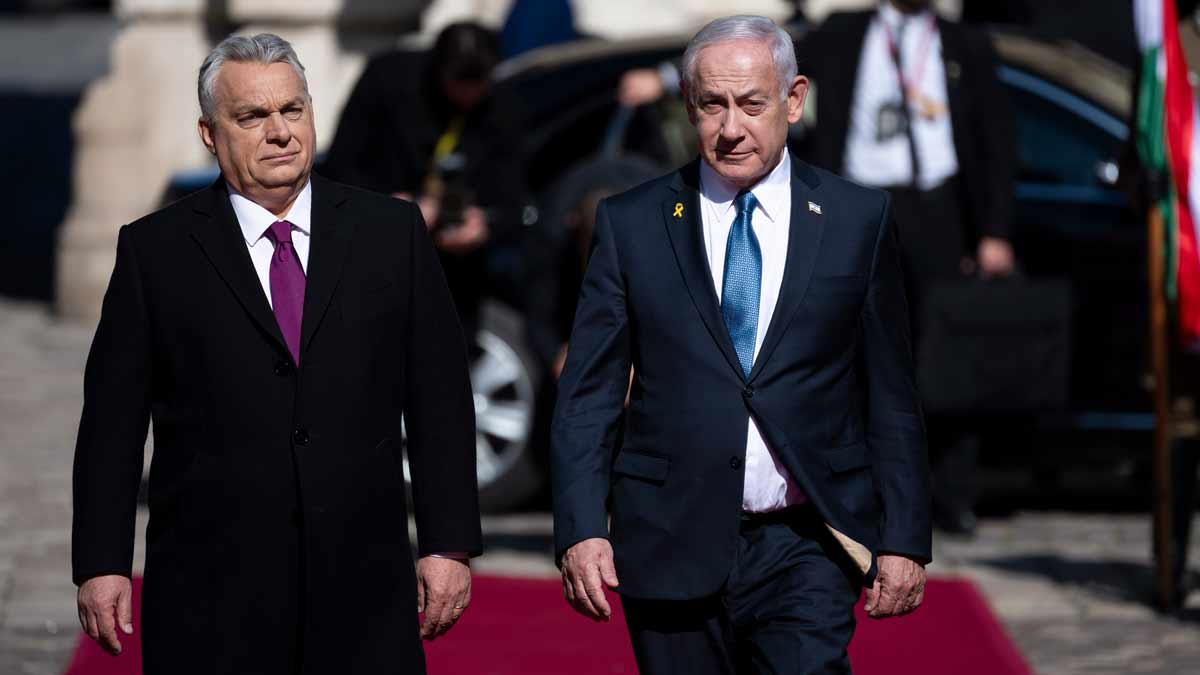Why Hungary decided to withdraw from International Criminal Court amid Netanyahu’s visit
 Israeli Prime Minister Benjamin Netanyahu, right, and Hungarian Prime Minister Viktor Orban, left, participate in a welcoming ceremony with a guard of honor at Buda Castle in Budapest, Hungary | AP
Israeli Prime Minister Benjamin Netanyahu, right, and Hungarian Prime Minister Viktor Orban, left, participate in a welcoming ceremony with a guard of honor at Buda Castle in Budapest, Hungary | AP
Amid the International Criminal Court's arrest warrant against Israeli Prime Minister Benjamin Netanyahu over Gaza war crimes, Hungary has made a bold statement by announcing its decision to withdraw from ICC.
Prime Minister Viktor Orban's statement came after Netanyahu visited Budapest.
Hungary leaving the ICC is a "bold and principled" decision, said Netanyahu on Thursday.
"Hungary will exit the ICC. The government will initiate the withdrawal procedure on Thursday in accordance with the constitutional and international legal framework," said Orban's chief of staff, Gergely Gulyas.
As part of the process, Hungary will formally notify the UN secretary general's office and the withdrawal will come into effect a year later. Hungary cited ICC being ‘political’ as the reason behind the decision.
However, the Dutch foreign minister Casper Veldkamp on Thursday said that as long as Hungary remained officially a member of the ICC, it should "fulfil all its obligations to the court".
Any country being a member of the ICC is required to detain and extradite anyone subject to a warrant but Hungary had argued this law was never promulgated.
"It was never made part of Hungarian law," said Gulyas. It implies that no ICC measure can be legally carried out within Hungary.
In November last year, Orban said that he would "guarantee" the ICC's ruling would have "no effect in Hungary".
Meanwhile, Israel's foreign minister Gideon Saar posted on social media thanking Hungary for its clear and moral stance. ICC, "lost its moral authority after trampling the fundamental principles of international law in its zest for harming Israel's right to self-defence."
Earlier, Netanyahu's government said that the court lost its legitimacy by issuing warrants against a democratically elected leader for exercising the right of self-defence.
Orban has always supported Israel’s right-wing PM Netanyahu. Hungary has frequently blocked EU statements or sanctions against Israel.
Since ICC warrants, Hungary's visit is Netanyahu's second foreign trip. In February he travelled to the US, which is not a member of the ICC.
ICC had issued warrants against Netanyahu, former defence chief Yoav Gallant and Hamas leader Ibrahim al-Masri after finding reasonable grounds to believe Netanyahu and Gallant were criminally responsible for acts including murder, persecution and starvation as a weapon of war.
While, the EU members are divided over whether to enforce the warrants. Countries like Spain, the Netherlands and Finland, say that they would enforce them, while others, including Germany and Poland, suggest they could find a way for Netanyahu to visit without being arrested. France has said Netanyahu should be immune from the warrant since Israel is not an ICC member.
The ICC has a membership of 125 countries. Out of them, 33 are African states, 19 are Asia-Pacific states, 20 are from Eastern Europe, 28 are from Latin America and Caribbean states and 25 are from Western European and other states.
Middle East